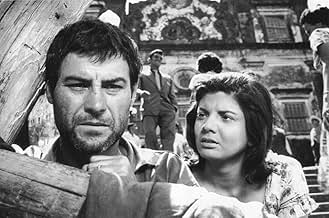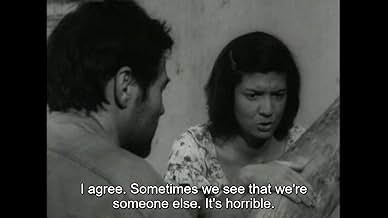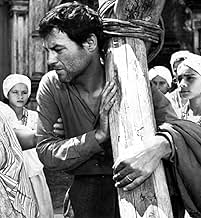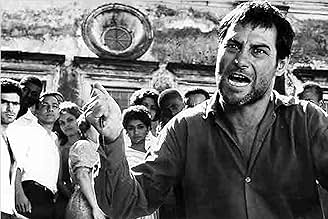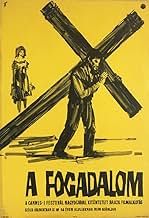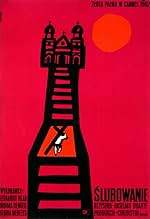O Pagador de Promessas
- 1962
- 1 घं 38 मि
IMDb रेटिंग
8.3/10
4.4 हज़ार
आपकी रेटिंग
अपनी भाषा में प्लॉट जोड़ेंA simple yet devout Christian makes a vow to Saint Barbara after she saves his donkey, but everyone he meets seems determined to misunderstand his intentions. Will he be able to keep his pro... सभी पढ़ेंA simple yet devout Christian makes a vow to Saint Barbara after she saves his donkey, but everyone he meets seems determined to misunderstand his intentions. Will he be able to keep his promise in the end?A simple yet devout Christian makes a vow to Saint Barbara after she saves his donkey, but everyone he meets seems determined to misunderstand his intentions. Will he be able to keep his promise in the end?
- 1 ऑस्कर के लिए नामांकित
- 4 जीत और कुल 1 नामांकन
Leonardo Villar
- Zé do Burro
- (as Leonardo Vilar)
Antonio Pitanga
- Coca
- (as Antonio L. Sampaio)
João Di Sordi
- Police Detective
- (as João Desordi)
Veveldo Diniz
- Sacristão
- (as Velvedo Diniz)
Napoleao Lopes Filho
- Bispo
- (as Napoleão L. Filho)
फ़ीचर्ड समीक्षाएं
This great film, received the principal prize in Cannes and it is one of the best Brazilian films of all the times. A simple man, whose donkey was sick, gets its cure and he decides like this to pay a promise Saint Barbra, to who attributed the salvation of the animal.
Main representative of the brazilian "Cinema Novo" , the film is based on an exceptional play, and it is a realistic film, very well interpreted and driven, and it shows one on the most dramatic sides of the Brazilian people: the fidelity in paying a promise, cost what to cost!
Main representative of the brazilian "Cinema Novo" , the film is based on an exceptional play, and it is a realistic film, very well interpreted and driven, and it shows one on the most dramatic sides of the Brazilian people: the fidelity in paying a promise, cost what to cost!
The only old thing about this movie is its release date. It's very contemporary and universal. O Pagador de Promessas (1962) is based on a play written by Dias Gomes and performed for the first time in 1960.
(About the first scene so not really a spoiler) Zé and his wife, Rosa, left their land, in the country, and went to the city so Zé could pay a promise he made for a saint called Santa Bárbara. He promised to carry a wooden cross all the way to the city and enter Santa Bárbara church with it if his best friend was healed by the saint. (Paying promisses is still common in Brazil ).
I won't say why exactly but the priest doesn't let he enters the church.
It might seem a minor conflict, but it's not and it escalates through the narrative in a chocking way to Zé, Rosa and audience.
Through the obstacles, Gomes criticizes many social institutions and Brazilian society as a whole in a brilliant way, mixing comedy with drama, what was totally brought to light in Anselmo's adaptation.
In this path, the acting is really important and it's fantastic.
Leonardo Villar portrays perfectly Zé certainty and naivety; Glória Menezes thought of everything, from the accent to the way of moving and the confusion Rosa shows; Dionísio Azevedo made a perfect traditional priest and everybody else were great in their respective roles, an awesome cast.
The technical features are amazing, the sets, the costume design, Duarte's shots, Chock Fowle cinematography and Gabriel Migliori scores.
What stands out in the movie is the representation of Brazilian Culture, which is what the film defends, the beautiful mix Brazil is, of European, Indian, African and many other cultures.
(About the first scene so not really a spoiler) Zé and his wife, Rosa, left their land, in the country, and went to the city so Zé could pay a promise he made for a saint called Santa Bárbara. He promised to carry a wooden cross all the way to the city and enter Santa Bárbara church with it if his best friend was healed by the saint. (Paying promisses is still common in Brazil ).
I won't say why exactly but the priest doesn't let he enters the church.
It might seem a minor conflict, but it's not and it escalates through the narrative in a chocking way to Zé, Rosa and audience.
Through the obstacles, Gomes criticizes many social institutions and Brazilian society as a whole in a brilliant way, mixing comedy with drama, what was totally brought to light in Anselmo's adaptation.
In this path, the acting is really important and it's fantastic.
Leonardo Villar portrays perfectly Zé certainty and naivety; Glória Menezes thought of everything, from the accent to the way of moving and the confusion Rosa shows; Dionísio Azevedo made a perfect traditional priest and everybody else were great in their respective roles, an awesome cast.
The technical features are amazing, the sets, the costume design, Duarte's shots, Chock Fowle cinematography and Gabriel Migliori scores.
What stands out in the movie is the representation of Brazilian Culture, which is what the film defends, the beautiful mix Brazil is, of European, Indian, African and many other cultures.
It is not a surprise that this movie won the golden palm in Cannes. The story of the man that carry a big and heavy cross as a promise for the healing of his donkey is the simpliest and the most beautiful. The poetic way as it is shown became the film an unforgettable classic, with Zé as the protagonist. For sure, technically it is a pre-historic film, the sound quality and editing is really bad, but it even help the audience to focus what really cares. That is not only about poverty, but about humanity. If you liked Central Station, you can't miss.
I love to watch old black and white movies and if you look for the history of foreign films up for an Oskar you find some gems like this movie. Such a real Brazilian movie and especially from Salvador de Bahia, the old capital where the cultural history of Brazil (except for the original people) is present. Colonial white oppression, the corrupt white middle class, the African people with their religious cultures and capoeira, the Catholic Church between them but like always only saving it's own position and then simple campesino who embodies the true values of human kind. In a collusion of them all, feasts, religion and fights occur and turn into a spiritual happening, a cruxifiction in which human dignity prevails. A wonderful movie from times when things seems to be clear.
This film is great! One of the best movies I have ever seen. About faith, religion, poverty...well, about life and all that surrounds us
Could have been just another sentimental and dishonest movie about human condition but no! It is beautiful and trully rewarding... A Masterpiece, do yourselves a favor and watch this movie!
Could have been just another sentimental and dishonest movie about human condition but no! It is beautiful and trully rewarding... A Masterpiece, do yourselves a favor and watch this movie!
क्या आपको पता है
- ट्रिवियाFirst Brazilian film to be nominated for an Oscar.
- कनेक्शनEdited into A Edição do Nordeste (2023)
टॉप पसंद
रेटिंग देने के लिए साइन-इन करें और वैयक्तिकृत सुझावों के लिए वॉचलिस्ट करें
- How long is The Given Word?Alexa द्वारा संचालित
- Where can I watch this film?
विवरण
बॉक्स ऑफ़िस
- दुनिया भर में सकल
- $8,229
- चलने की अवधि1 घंटा 38 मिनट
- रंग
- ध्वनि मिश्रण
- पक्ष अनुपात
- 1.33 : 1
इस पेज में योगदान दें
किसी बदलाव का सुझाव दें या अनुपलब्ध कॉन्टेंट जोड़ें


